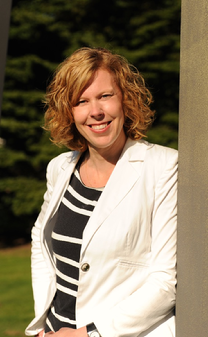Biography
Janine Post completed her PhD on signaling events regulating embryonic development and cancer at Memorial University of Newfoundland, Canada. As a postdoc at the prestigious Max Planck Institute for Biophysical Chemistry in Germany (http://www.mpibpc.mpg.de/en) she developed novel biophysical techniques for the visualization of protein dynamics and protein interactions in living embryos and living cells. In 2010 she was appointed assistant professor in the Tissue Regeneration group of prof. dr. Clemens van Blitterswijk. Currently she works in the department of Developmental BioEngineering that started in January 2012, and is chaired by prof. dr. Karperien. She currently supervises 4 PhD students, and a post-doc working on various aspects of signaling events in cartilage development and degeneration.
Janine’s research is aimed toward understanding the mechanisms regulating cartilage hypertrophy and degenerative cartilage diseases. For this she employs a variety of molecular biology, biochemical and biophysical techniques in combination with computational modeling to understand signaling pathways important in the development, maintenance and loss of cartilage homeostasis.
J.N.Post, PhD
Assistant professor
Department of Developmental BioEngineering
University of Twente
Faculty Science & Technology
MIRA Institute for Biomedical Technology and Technical Medicine
Zuidhorst Room ZH125
Drienerlolaan 5
7522NB Enschede,
The Netherlands
P.O. Box 217
7500 AE Enschede
The Netherlands
+31-(0)53-489-4205
j.n.post@utwente.nl
Research focus: Dynamics in signaling events in articular cartilage
Articular cartilage is a highly resilient tissue that covers the surfaces at the ends of long bones. Because of its lubricating properties, it ensures the pain-free and supple movements of our joints. Cartilage is mainly composed of one single cell type, the chondrocyte, that secretes and shapes the cartilaginous matrix that is necessary for its load-bearing properties. Articular cartilage has low self-repair and regenerative capabilities. Therefore, if left untreated, cartilage injury results over time in complete erosion of the cartilage surface with arthroplasty (total joint replacement surgery) as the only treatment option.
All cells in the body respond to external signals that are relayed over the plasma membrane through an intracellular network to the cell nucleus, where gene transcription is activated. Kinases, a class of enzymes that can phosphorylate and thereby regulate target proteins, play a pivotal role in this intracellular signaling network and are responsible for integration of all signals into a specific cellular response. When cartilage tissue is damaged different signals are generated, causing inflammation and subsequent cartilage degeneration. These signals counteract and may overrule the intrinsic repair response of cartilage. To determine the optimal combination of bioactive factors that will promote cartilage formation after trauma, a better understanding of cell signaling in cartilage is needed. The complexity of the integrating signals severely constrain a complete and quantitative analysis of the precise signals that dictate cartilage maintenance.
To obtain insight into the function of this complex network we generated a dynamic computational model of chondrocytes, the Executable CHOndrocyte or ECHO. In ECHO cell fates corresponding to osteoarthritis as well as healthy chondrocytes can be investigated. We use ECHO to predict potential targets for switching from an OA-like chondrocyte to a healthy articular chondrocyte. Using ECHO we analyze the most influential pathways, and performed in silico experiments to obtain insight into the molecular mechanisms of cartilage development and disease. ECHO’s predictions are validated by biochemical (qPCR, IHC, IF) and biophysical techniques (FRAP and FRET).
Projects
- Cell communication of chondrocytes with executable modeling and phosphorylation events with peptide arrays, PhD student: Jetse Scholma (link to Jetses info page: https://www.utwente.nl/tnw/dbe/people/Former%20PhD%27s/JetseScholma/), Post-Doc Stefano Schivo, PhD (http://wwwhome.ewi.utwente.nl/~schivos/ and link to ANIMO web page http://fmt.cs.utwente.nl/tools/animo/ )
- Protein mobility determines osteoarthritis pathophysiology, Reumafonds project 13-3-404 ,PhD student: Kannan Govindaraj (link to Kannans info page https://www.utwente.nl/tnw/dbe/people/phd_students/kannan-govindaraj/ )
- Staging osteoarthritis by lipid profiles, Reumafonds project number 13-2-402, PhD student: Brenda Bakker (https://www.utwente.nl/tnw/dbe/people/phd_students/biograpy-brenda-bakker/ ) in collaboration with the Ron Heeren lab, Maastricht (http://www.maastrichtuniversity.nl/web/Institutes/MaastrichtMultiModalMolecularImagingInstitute/DivisionOfImagingMassSpectrometry.htm )
- Signaling antagonists determine cell fate, Reumafonds project 11-1-408, PhD student: Leilei Zhong (https://www.utwente.nl/tnw/dbe/people/phd_students/Leilei%20Zhong/ )
- Cell-communication in co-cultures, PhD student: Parthiban Chinnagounder Periyasami (https://www.utwente.nl/tnw/dbe/people/phd_students/ParthibanPeriyasami/ )
- Natural peptides in amyloid structures as instructive carriers, PhD student: Maurice van Dalen (https://www.utwente.nl/tnw/nbp/members/cvs/maurice_vandalen/ ). Joint project with NBP group of Mireille Claessens, (https://www.utwente.nl/tnw/nbp/)
Publications of interest
- Stefano Schivo, Jetse Scholma, Brend Wanders, Ricardo A Urquidi Camacho, Paul E van der Vet, Marcel Karperien, Rom Langerak, Jaco van de Pol, Janine N Post. Modelling biological pathway dynamics with Timed Automata. Bioinformatics & Bioengineering (BIBE), 2012 IEEE 447-453
- Biological networks 101: computational modeling for molecular biologists. Scholma J, Schivo S, Urquidi Camacho RA, van de Pol J, Karperien M, Post JN. Gene. 2014 Jan 1;533(1):379-84. doi: 10.1016/j.gene.2013.10.010. Epub 2013 Oct 12. PMID: 24125950
- Differentiation of mesenchymal stem cells under hypoxia and normoxia: lipid profiles revealed by time-of-flight secondary ion mass spectrometry and multivariate analysis. Georgi N, Cillero-Pastor B, Eijkel GB, Periyasamy PC, Kiss A, van Blitterswijk C, Post JN, Heeren RM, Karperien M. Anal Chem. 2015 Apr 7;87(7):3981-8. doi: 10.1021/acs.analchem.5b00114. Epub 2015 Mar 19. PMID: 25742117
- Metabolic programming of mesenchymal stromal cells by oxygen tension directs chondrogenic cell fate. Leijten J, Georgi N, Moreira Teixeira L, van Blitterswijk CA, Post JN, Karperien M. Proc Natl Acad Sci U S A. 2014 Sep 23;111(38):13954-9. doi: 10.1073/pnas.1410977111. Epub 2014 Sep 9. PMID: 25205812
- Wu L, Leijten JC, Georgi N, Post JN, van Blitterswijk CA, Karperien M. Trophic effects of mesenchymal stem cells increase chondrocyte proliferation and matrix formation. Tissue Eng Part A. 2011 May;17(9-10):1425-36. Epub 2011 Feb 28.
- Ma B, Leijten JC, Wu L, Kip M, van Blitterswijk CA, Post JN, Karperien M. Gene expression profiling of dedifferentiated human articular chondrocytes in monolayer culture. Osteoarthritis Cartilage. 2013 Apr;21(4):599-603. doi: 10.1016/j.joca.2013.01.014. Epub 2013 Jan 30.
Publications: http://www.ncbi.nlm.nih.gov/pubmed/?term=Post%20JN%5BAuthor%5D&cauthor=true&cauthor_uid=25205812
